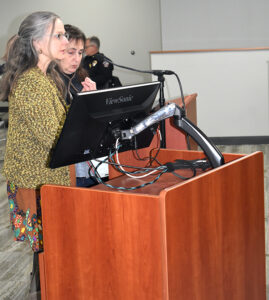Jean Seberg would have turned 80 this week
Several lifetimes worth of triumphs and tragedies were packed into Jean Seberg’s 40 years on this earth. Thirty-nine years ago, she died in Paris of an apparent suicide, months shy of her 41st birthday.
The Marshalltown native, who became the darling of French cinema, is remembered as much for her film career as for her political activism and the FBI case in which she was involved.
Seberg’s image continues to grace the pages of modern-day fashion magazines. She has been the subject of several books and documentaries here and abroad. In March 2018, it was announced Kristen Stewart would portray Seberg in the upcoming film “Against All Enemies.”
In 2011, a local campaign was started to host an annual Jean Seberg Festival, held during the month of her birth. Due to tornado damage sustained at the Orpheum Theater, the Swingin’ 60s Seberg FUNdraiser slated for this weekend was canceled.
“Once the Orpheum is repaired, we will again host events which will feature Jean’s life’s work and make known contemporary artists inspired by her legacy,” coordinator Nancy Adams said. “We believe Jean was a woman ahead of her time; a passionate, talented woman whose art, heart and words touched many and whose impact/effect lingers still. In the interim, locally, Jean’s story is being shared in classrooms at MCC through writing assignments and film showings, and updates on social media. Her worldwide circle of influence knows no bounds — never has.”
She was born Nov. 13, 1938, the second child of Dorothy and Ed Seberg. Older sister Mary Ann, and younger brothers Kurt and David rounded out the family. Ed ran a popular pharmacy in the 13th Street District, while Dorothy worked as a school teacher. Seberg was on track to catapult to stardom at age 18 after winning the lead role of Joan of Arc in Otto Preminger’s 1957 film “Saint Joan.” The film flopped, and she worked to prove she belonged in the movies. Preminger then cast her in the tearjerker “Bonjour Tristesse.” She told Coronet magazine at the time she hoped to not become “one of the youngest has-beens in movie history.”
Seberg came to international acclaim after accepting a role in the French New Wave film “Breathless” directed by Jean-Luc Godard.
“So I did Breathless — no salary, no script,” Jean told a film magazine in the 1970s. “Godard worked from day to day and would come in with these crumpled sheets of yellow paper. We literally thought we were making home movies that would never be seen. Then after about two weeks we saw the first batch of rushes, with Godard and François Truffaut, whose idea the film was. We sat and looked at it and we said, ‘Well, it may never get out, but it sure is different to what any of us had ever seen.'”
Following the success of the picture, women all over France cropped their hair, requesting the Jean Seberg cut.
A series of film roles followed, including the 1964 psychological thriller “Lilith” opposite Warren Beatty, “A Fine Madness” alongside Sean Connery and others. She was given a small role in the star-studded 1970 disaster film “Airport.”
Politically active, she was a financial donor of Jim Brown’s Negro Industrial Economic Union, attended Southern Christian Leadership Conference rallies, opposed the Vietnam War and supported the plight of Algerians living in France. She had been a member of the NAACP since age 14. But it was her involvement with the Black Panther Party that made her a target of the FBI’s Counter-Intelligence Program, which wiretapped her telephone and kept her under surveillance.
On April 21, 1970, Seberg received a middle of the night phone call in Paris from Black Panthers Elaine Brown and Raymond Hewitt. In the conversation, she referred to Hewitt as Johnny Appleseed because he had recently impregnated two women.
Six days later, R.W. Held of the Los Angeles branch of the FBI sent a memo to Director J. Edgar Hoover claiming Seberg was carrying Hewitt’s child (although his name was blacked out in the memo), based on what was overheard in the wiretap. Held’s plan was to leak the rumor to the press.
“It is felt that the possible publication of Seberg’s plight could cause her embarrassment and serve to cheapen her image with the general public,” the agent wrote in the memo.
Nine days later, Hoover sent a reply.
“It would be better to wait approximately two additional months until Seberg’s pregnancy would be more obvious. Jean Seberg has been a financial supporter of the BPP and should be neutralized.”
The story was picked up by Los Angeles Times gossip columnist Joyce Haber who wrote, “According to really ‘in’ international sources … Miss A is expecting and … Papa’s said to be a rather prominent Black Panther.”
Although estranged from her second husband Romain Gary, he claimed paternity. On Aug. 7, Seberg overdosed on pills. Twelve days later, Newsweek magazine became the first publication to refer to Seberg by name in the story planted by the FBI. She later sued the magazine for libel and won. Seberg later went into premature labor and delivered the baby on Aug. 23, 1970. Her daughter Nina Hart Gary died two days later and is buried at Riverside Cemetery.
On December 29, 1970, the FBI put the actress on its Security Index-Priority 3 list, reserved for an individual “because of background is potentially dangerous; or has been identified as a member or participant in communist movement or has been under active investigation as member of other group or organization inimical to the U.S.” Her FBI file, which exceeds 300 pages, is heavily censored and much of it remains unreleased.
While appearing in some U.S. films, Seberg spent the remainder of her life focused on making movies in Europe, becoming a director and raising her son Alexandre Diego Gary. She battled alcohol, substance abuse and mental health issues.
In 1976, she received a letter from the U.S. Department of Justice informing her that it had been the FBI who had started the rumor about the baby being fathered by a Black Panther.
On the morning of Aug. 30, 1979, Seberg went missing. Eight days later, police found her dead in the back seat of her car, blocks away from her residence. A note addressed to her son was found. A memorial service was held for her in Marshalltown and her final resting place is in the Cimetière du Montparnasse, Paris.
Times-Republican editor Warren Robeson, who had been friends with the actress, wrote an editorial following her death.
“Time and again she bounced back. That characteristic is what makes her death by suicide so incredible to me. It seems impossible that I will not again sit in the living room of her gracious parents, the Ed Sebergs, during one of her visits home and ask, ‘Well, what’s next Jean?’ and hear her enthusiastic reply outlining a forthcoming film … The FBI admitted Friday that it planted the false story because she was supporting black causes. If they had only know Jean as we knew her.”
Seberg’s sister Mary Ann Shuey, 82, who resides in Chattanooga, Tenn., has been a regular attendee of the Seberg festivals, and has shared memories of her late sister with various publications and for documentaries.
“My first thought in how I’d like Jean to be remembered is as a loving, caring daughter, sister, aunt and mother,” Shuey told the Times-Republican. “I always think of Jean as someone who was way ahead of her time in not only her thoughts, but her actions as well.”
Seberg has been deceased nearly as long as she was alive, and Shuey said there are so many life experiences and events her sister was not there for.
“I miss not having a sister with whom to visit and share special occasions. Jean was always very thoughtful about remembering birthdays and other family occasions, as well as keeping in touch with family no matter where she was. I continue to be overwhelmed by all the fans worldwide who follow her in films, books, on TV and in photographs, and show their love for and appreciation of her in so many ways.
“She would be thrilled to know that she has been remembered in Marshalltown for all these years by so many people, many of whom did not even know her.”
- CONTRIBUTED PHOTO Marshalltown native Jean Seberg (1938-1979) would have turned 80 this week. She is remembered as much for her film career as for her political activism and the FBI case in which she was involved.
- CONTRIBUTED PHOTO This document came from Seberg’s FBI file, released through the Freedom of Information Act. It shows the FBI’s plan to plant a false story with the press pertaining to Seberg’s pregnancy to “possibly cause her embarrassment and tarnish her image with the general public.”
- CONTRIBUTED PHOTO The LA Times ran an article about Seberg following her death in 1979, citing its publication as being one of the media outlets to first run a fictitious story about Seberg, planted by the FBI.
———-
Contact Sara Jordan-Heintz at
(641) 753-6611 or
sjordan@timesrepublican.com








